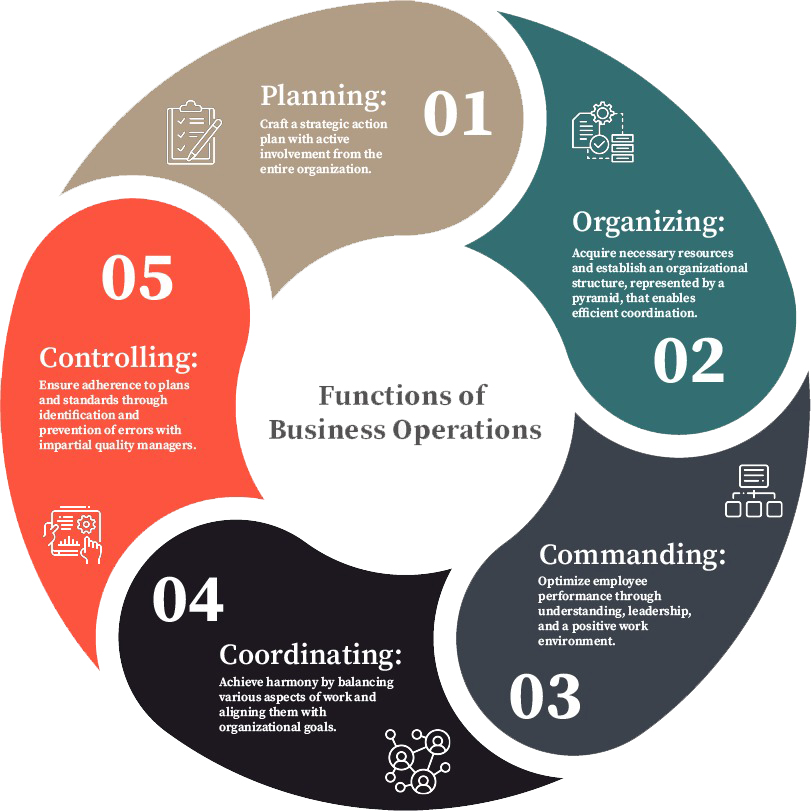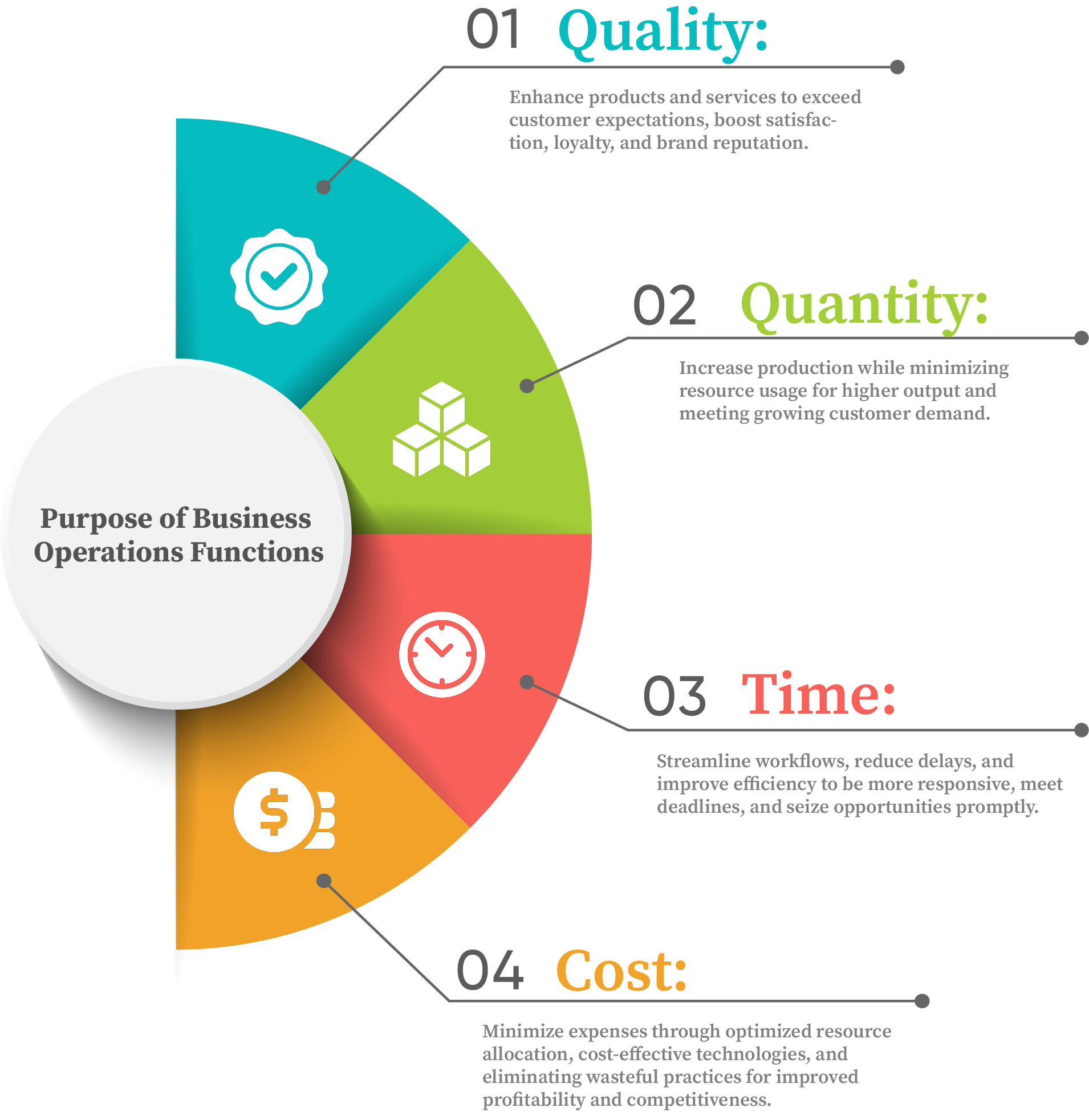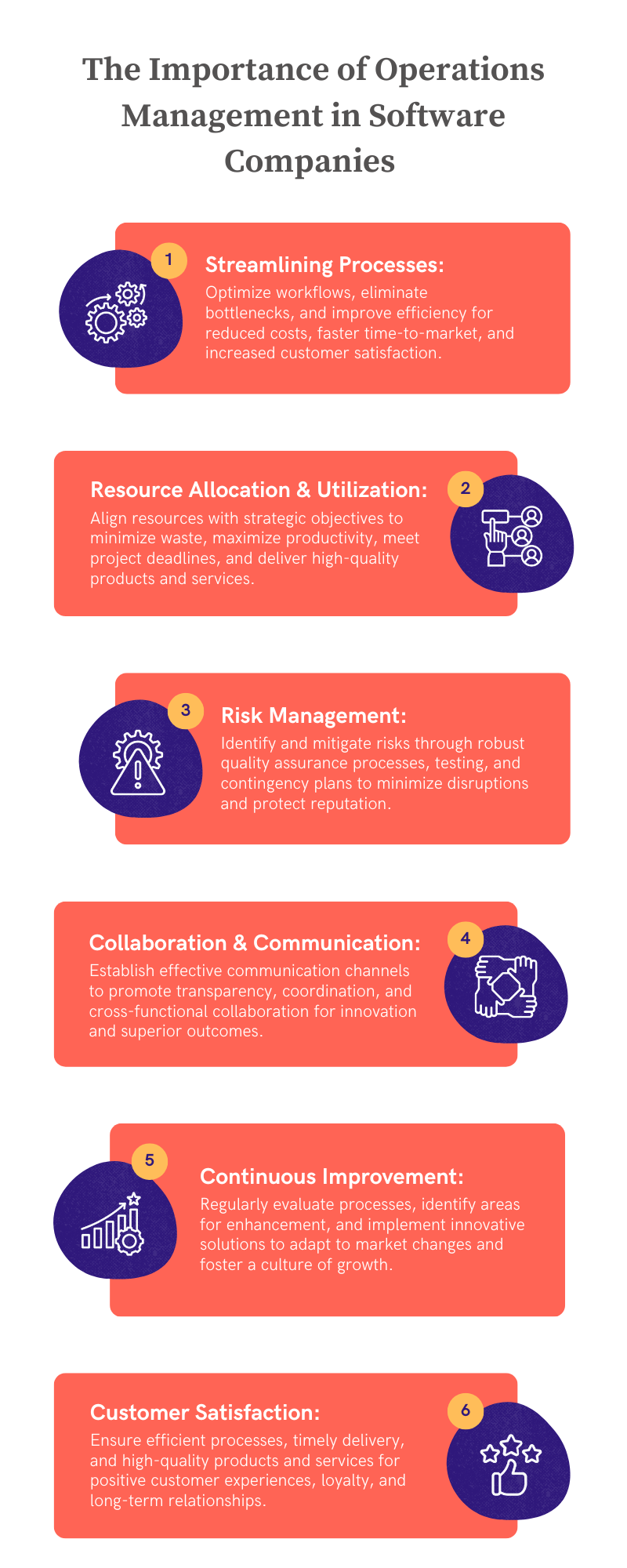In the dynamic and competitive world of software companies, achieving hyper-efficiency is crucial for success. With the rapid advancement of technologies, discerning customers, and intense competition, software companies need to find ways to streamline their processes, boost productivity, and deliver exceptional outcomes. One promising approach to attain these goals revolves around business operations. By adopting a strategic approach to managing operations, software companies can unlock hyper-efficiency and gain a competitive advantage in the market.
In this article we will introduce the concept of “business operations in software companies” and elucidate how and why it can significantly enhance effectiveness and efficiency.
What are Business Operations?
A business operation is a set of activities that create value by transforming inputs into outputs.
Sometimes called operations management—business operation is the practice of planning, controlling, organizing, and directing these different operations to achieve the highest level of efficiency within your organization.
Functions of Business Operations
Henri Fayol is widely recognized as a prominent figure in management, offering timeless insights that continue to shape the way organizations are run. In his influential work, “Industrial and General Administration,” Fayol outlined the five essential functions of operations management, which, when implemented successfully, lead to unparalleled achievements.
Let’s explore these functions:
Planning:
At the core of management lies the crucial function of planning. A well-crafted action plan, taking into account available resources and anticipated trends, serves as the foundation. Fayol emphasized the importance of active participation from the entire organization in this challenging and critical task.
The ideal plan should combine:
Purposefulness: This means that the overall plan should be supported by the individual plans of smaller structures and units within the organization.
Continuity: The planned actions should be seen as interconnected components of an ongoing developmental process.
Flexibility: The plan should account for the potential occurrence of unforeseen circumstances and be able to adjust accordingly.
Accuracy: The plan should strive to be as precise and accurate as possible.
Organizing:
The second function, organizing, ensures the smooth operation of a company. It involves acquiring necessary resources like raw materials, tools, capital, and personnel. Fayol underscored the significance of organizational structure, stating that as the number of staff increases, diverse functions emerge, demanding enhanced control. This hierarchical model, represented by an organizational pyramid, forms the basis of efficient coordination.
Commanding:
Commanding focuses on optimizing employee efforts in the best interest of the organization. Fayol emphasized that managerial success relies on a blend of personal qualities and knowledge of general management principles. Managers should strive to understand their subordinates, combat incompetence, remain informed about employee contracts, set a positive example, conduct regular inspections, hold meetings to provide direction and prioritize objectives, avoid micromanagement, and foster a work atmosphere that encourages unity, initiative, and loyalty.
Coordinating:
Coordination, the fourth function, aims to achieve optimal harmony among various organizational activities. Effective coordination streamlines operations, making the organization more successful. It involves balancing different aspects of work, such as aligning financial resources, production requirements, inventory levels, and market demands. Fayol recommended daily meetings to facilitate coordination, focusing on work progress, interdepartmental cooperation, and common issues. These meetings help synchronize activities and establish current priorities.
Controlling:
The final function, controlling, ensures adherence to predetermined plans, principles, and work standards. It serves to identify errors and weaknesses, neutralize them, and prevent their recurrence. As Fayol writes:
“Control affects everything – products, people, and operations.”
Fayol believed that control should be handled by impartial quality managers who are not hierarchically related to employees. This unbiased form of control complements traditional management and uncovers valuable information that may remain hidden otherwise.
Purpose of Business Operations Functions
The focus of Fayol’s management functions is to bring improvements in four crucial aspects of a business:
Quality:
This refers to enhancing the overall quality of products and services provided by the organization. By implementing effective management strategies, companies can ensure that their offerings meet or exceed customer expectations. This emphasis on quality can lead to increased customer satisfaction, loyalty, and a positive brand reputation.
Quantity:
Increasing production while minimizing the use of resources is another important goal. By optimizing operational processes, organizations can produce more output with the same or fewer resources. This not only boosts productivity but also helps in meeting growing customer demand without excessive strain on the available resources.
Time:
Time is a critical factor in today’s fast-paced business environment. Fayol’s management functions aim to expedite the conversion of inputs into outputs. This involves streamlining workflows, reducing unnecessary delays, and improving efficiency throughout the production or service delivery process. By saving time, businesses can be more responsive, meet deadlines, and seize opportunities promptly.
Cost:
Managing costs is crucial for any organization’s financial health. Fayol’s approach emphasizes minimizing expenses associated with production. This can be achieved through various means, such as optimizing resource allocation, implementing cost-effective technologies, and eliminating wasteful practices. By reducing costs, companies can improve profitability, reinvest in growth initiatives, and remain competitive in the market.
Embracing business operations can help software companies unlock hyper-efficiency, gain a competitive advantage, and achieve optimal outcomes. By incorporating Fayol’s management functions into their management practices, organizations can enhance their performance, meet customer expectations, utilize resources efficiently, and achieve financial sustainability.
The Importance of Operations Management in Software Companies
Adopting operations management practices in software companies brings a multitude of benefits. Let’s explore some of the advantages:
Streamlining Processes:
Efficient operational management is essential for streamlining processes within software companies. By carefully analyzing and optimizing workflows, operational managers can identify bottlenecks, eliminate redundant activities, and improve the overall efficiency of operations. This leads to reduced costs, faster time-to-market, and increased customer satisfaction. Streamlining processes also enable software companies to adapt quickly to changing market dynamics and stay ahead of the competition.
Resource Allocation and Utilization:
Operational management enables software companies to effectively allocate and utilize their resources. This includes human resources, infrastructure, technology, and financial capital. By aligning resources with strategic objectives, operational managers can ensure that the right resources are available at the right time, minimizing waste and maximizing productivity. Efficient resource allocation and utilization enable software companies to optimize their capabilities, meet project deadlines, and deliver high-quality products and services.
Risk Management:
Operational management plays a crucial role in identifying and managing risks within software companies. Operational managers assess potential risks and develop strategies to mitigate them effectively. This involves implementing robust quality assurance processes, conducting thorough testing, and establishing contingency plans. By proactively addressing risks, software companies can minimize disruptions, protect their reputation, and maintain customer trust. Effective risk management also allows companies to seize opportunities and make informed decisions with confidence.
Collaboration and Communication:
span data-contrast=”auto”>Operational management fosters collaboration and communication within software companies. By establishing effective channels of communication, operational managers ensure that information flows seamlessly across departments and teams. This promotes transparency, enhances coordination, and facilitates cross-functional collaboration. When employees have a clear understanding of organizational objectives and can collaborate efficiently, they can work together towards achieving common goals, fostering innovation, and delivering superior outcomes.
Continuous Improvement:
Operational management emphasizes the importance of continuous improvement within software companies. By regularly evaluating processes, identifying areas for enhancement, and implementing innovative solutions, operational managers drive a culture of continuous learning and growth. This iterative approach enables software companies to adapt to market changes, embrace new technologies, and stay at the forefront of industry trends. Continuous improvement also empowers employees to contribute their ideas, take ownership of their work, and strive for excellence.
Customer Satisfaction:
Operational management directly impacts customer satisfaction in software companies. By ensuring efficient processes, timely delivery, and high-quality products and services, operational managers contribute to a positive customer experience. Satisfied customers not only become loyal advocates but also provide valuable feedback for further improvement. By consistently meeting customer expectations and exceeding them whenever possible, software companies can build a strong reputation, attract new customers, and foster long-term relationships.
Khoji for Agile: Boosting Operational Efficiency in Agile Software Companies
Agile software development methodologies have become increasingly popular due to their flexible and iterative approach. However, optimizing operational efficiency within Agile environments can be a daunting task. That’s why we’ve designed Khoji for Agile.
Khoji for Agile is an advanced software solution specifically designed to streamline operations with business directions and improve efficiency in Agile software companies. It offers a range of tailored features for Agile teams, including:
Agile Project Management:
With Khoji for Agile, project management becomes a breeze. Khoji’s intuitive interface simplifies the process, allowing teams to effortlessly track and manage projects. With real-time progress tracking, customizable dashboards, and automated notifications, bottlenecks are identified beforehand, ensuring smooth coordination and efficient resource allocation. No more wasting time and effort on outdated and cumbersome project management methods.
Resource Allocation and Capacity Planning:
Khoji for Agile enables software companies to allocate resources based on project requirements and team capacity. By ensuring that the right resources are focused on the right tasks, productivity soars while bottlenecks are minimized. With Khoji for Agile, teams can harness their full potential and achieve exceptional results.
Real-Time Insights:
Khoji for Agile provides comprehensive analytics and reporting capabilities that offer valuable insights into resource utilization and team efficiency. Stakeholders can make data-driven decisions, identify areas for improvement, and optimize their Agile processes for maximum results. With Khoji for Agile, success is no longer a shot in the dark but a calculated achievement.
Integration with Agile Tools:
Khoji for Agile seamlessly integrates with popular Agile tools like Jira, enabling teams to leverage their existing project management tools while gaining access to Khoji’s added functionality. Say goodbye to compatibility issues and hello to an unified and efficient workflow.
Final Thoughts:
Unlock the gateway to success in the software industry by embracing hyper-efficiency. With streamlined operations and Khoji for Agile, you can elevate productivity and drive remarkable outcomes. Seize this opportunity to revolutionize your company, outpace competitors, and boost profitability.
Schedule a demo of Khoji for Agile today and witness the extraordinary results for yourself.






